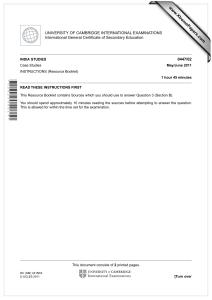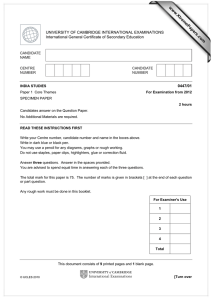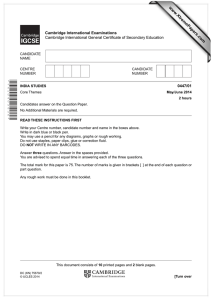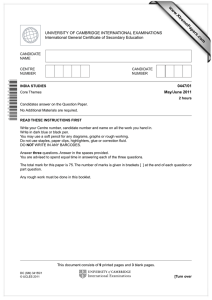www.XtremePapers.com
advertisement
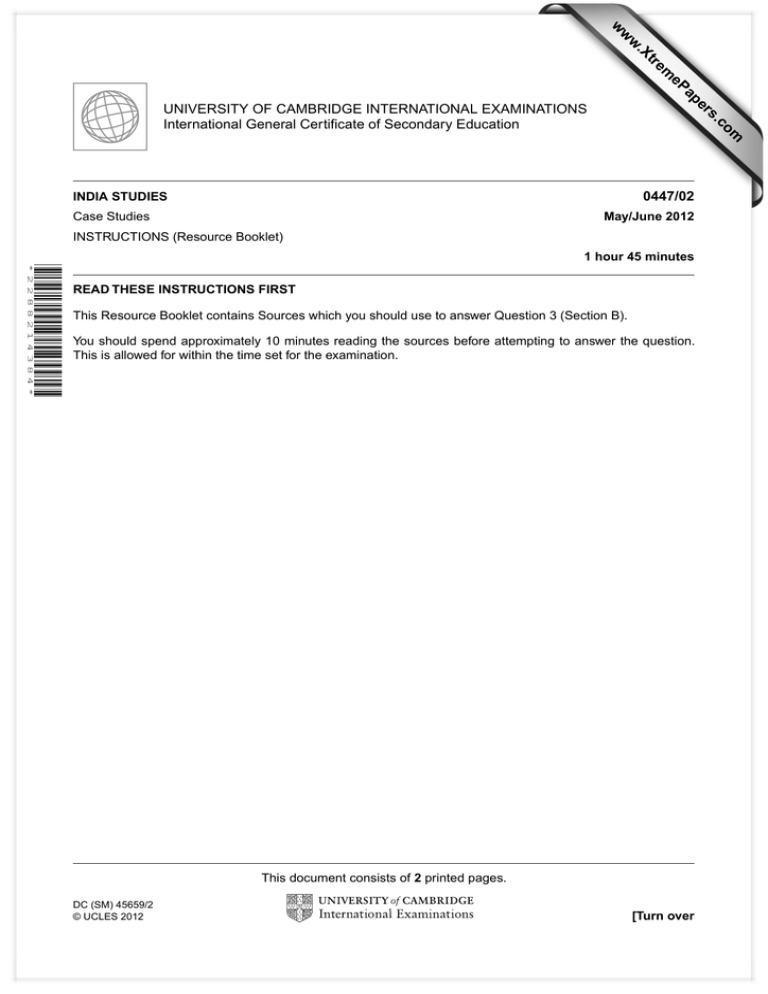
w w ap eP m e tr .X w om .c s er UNIVERSITY OF CAMBRIDGE INTERNATIONAL EXAMINATIONS International General Certificate of Secondary Education 0447/02 INDIA STUDIES Case Studies May/June 2012 INSTRUCTIONS (Resource Booklet) 1 hour 45 minutes * 2 2 8 8 2 1 4 3 8 4 * READ THESE INSTRUCTIONS FIRST This Resource Booklet contains Sources which you should use to answer Question 3 (Section B). You should spend approximately 10 minutes reading the sources before attempting to answer the question. This is allowed for within the time set for the examination. This document consists of 2 printed pages. DC (SM) 45659/2 © UCLES 2012 [Turn over 2 Source A: The daily use of time in India by men and women Activities (in hours) Men Women Income-generating work 6.0 2.40 Household and related work 0.45 5.20 Talking, Gossip 1.45 1.40 No work/Leisure/Reading 3.60 3.70 12.50 11.30 Sleep, self-care, etc. Source B Many women and many poor Indians in villages and slums across the country have been deprived of their right to subsidised food. Government reports suggest that the food is not reaching those for whom it is meant. Rates of theft vary from state to state, with the better ones such as Kerala getting more than 80% of subsidised food to their poor. However, in the northern state of Bihar, India’s second poorest with a population of 75 million, more than 80% of the food is stolen. The average varies between a quarter and a half of all food. Source C: Possible ways to improve the lives of those disadvantaged by caste and gender Issue 1: Improving literacy rates High illiteracy rates are still a major problem. Although there has been a rapid expansion of school education, with over 88% of villages having schools, the quality of education has declined and literacy rates are below those of China and Sri Lanka. The government needs to increase the amount spent on education as child illiteracy and child labour are closely linked; at the moment India is ranked 82 out of 116 on the proportion of money spent on education. India will not be able to develop a manufacturing sector that employs large numbers of people until a larger proportion of rural adults are educated to a minimum standard. By increasing literacy rates, the standard of living will rise and the disadvantaged will have the opportunity to escape from poverty. Issue 2: Improving health care Health care, particularly in rural areas, has been neglected. There are still large numbers of people with no access to safe water (19%), health services (25%) and sanitation (71%). The quality of services in rural areas is poor and many women still die in childbirth. The current death rate for mothers is as high as 507 per hundred thousand live births, partially because 60% of all births in rural India are attended by untrained persons. However, in states where education opportunities for women have improved, there has been a decline in infant mortality rates and the male-female ratio has improved. Where free primary health care is available at a local level, the results have been dramatic. In Kerala, over 90% of women deliver their babies in medical institutions. Issue 3: Improving equality of opportunity Equality was promised in India’s constitution, but this has not happened. India’s caste system may be in decline but it has not disappeared. The high number of positive discrimination policies has meant that most of the communities who were low in the caste order remain low in the social order today. Most of the undignified jobs are still done by members of the lower castes whilst those who were high in the social order still have the better jobs. Permission to reproduce items where third-party owned material protected by copyright is included has been sought and cleared where possible. Every reasonable effort has been made by the publisher (UCLES) to trace copyright holders, but if any items requiring clearance have unwittingly been included, the publisher will be pleased to make amends at the earliest possible opportunity. University of Cambridge International Examinations is part of the Cambridge Assessment Group. Cambridge Assessment is the brand name of University of Cambridge Local Examinations Syndicate (UCLES), which is itself a department of the University of Cambridge. © UCLES 2012 0447/02/INST/M/J/12






